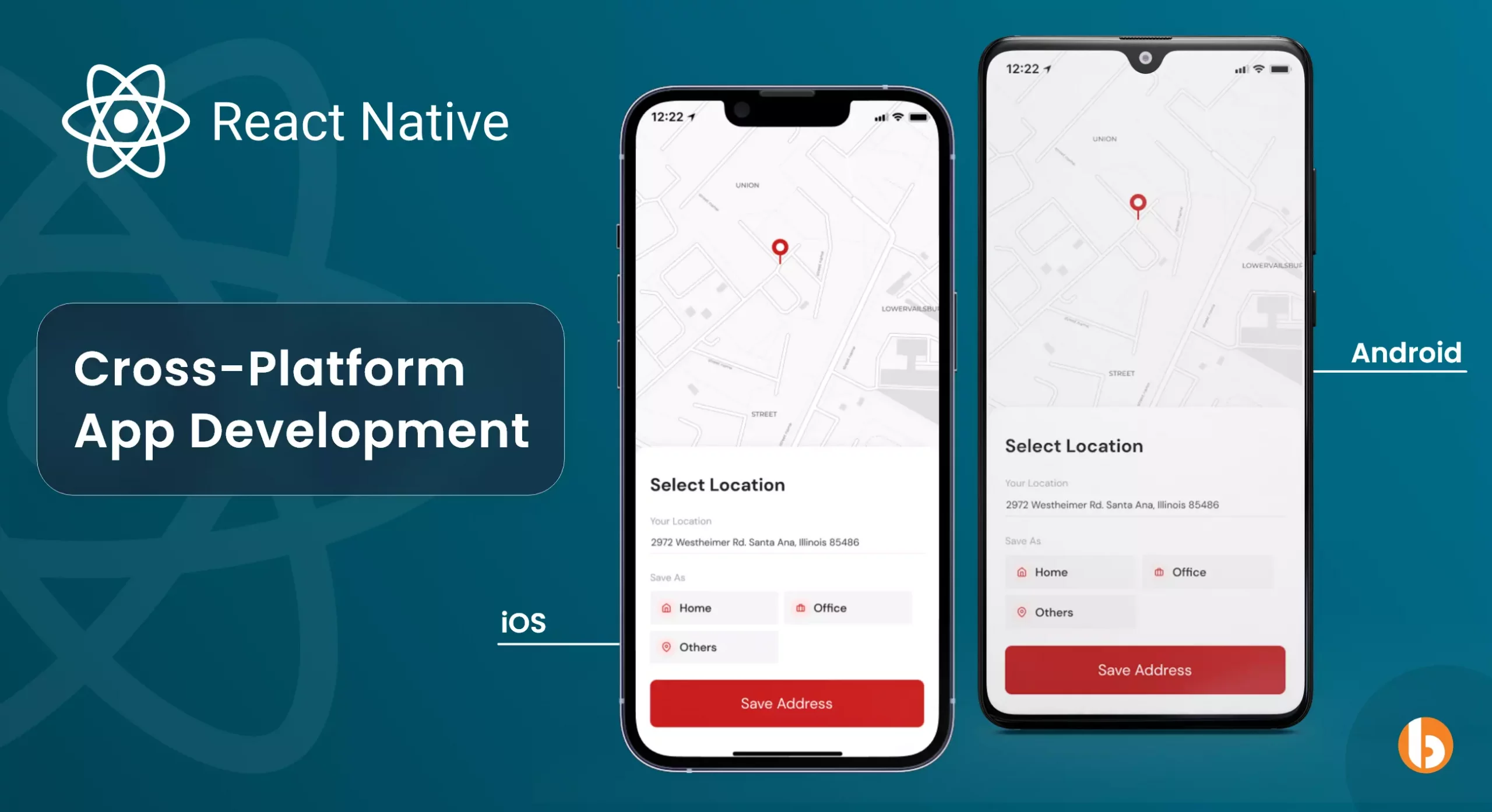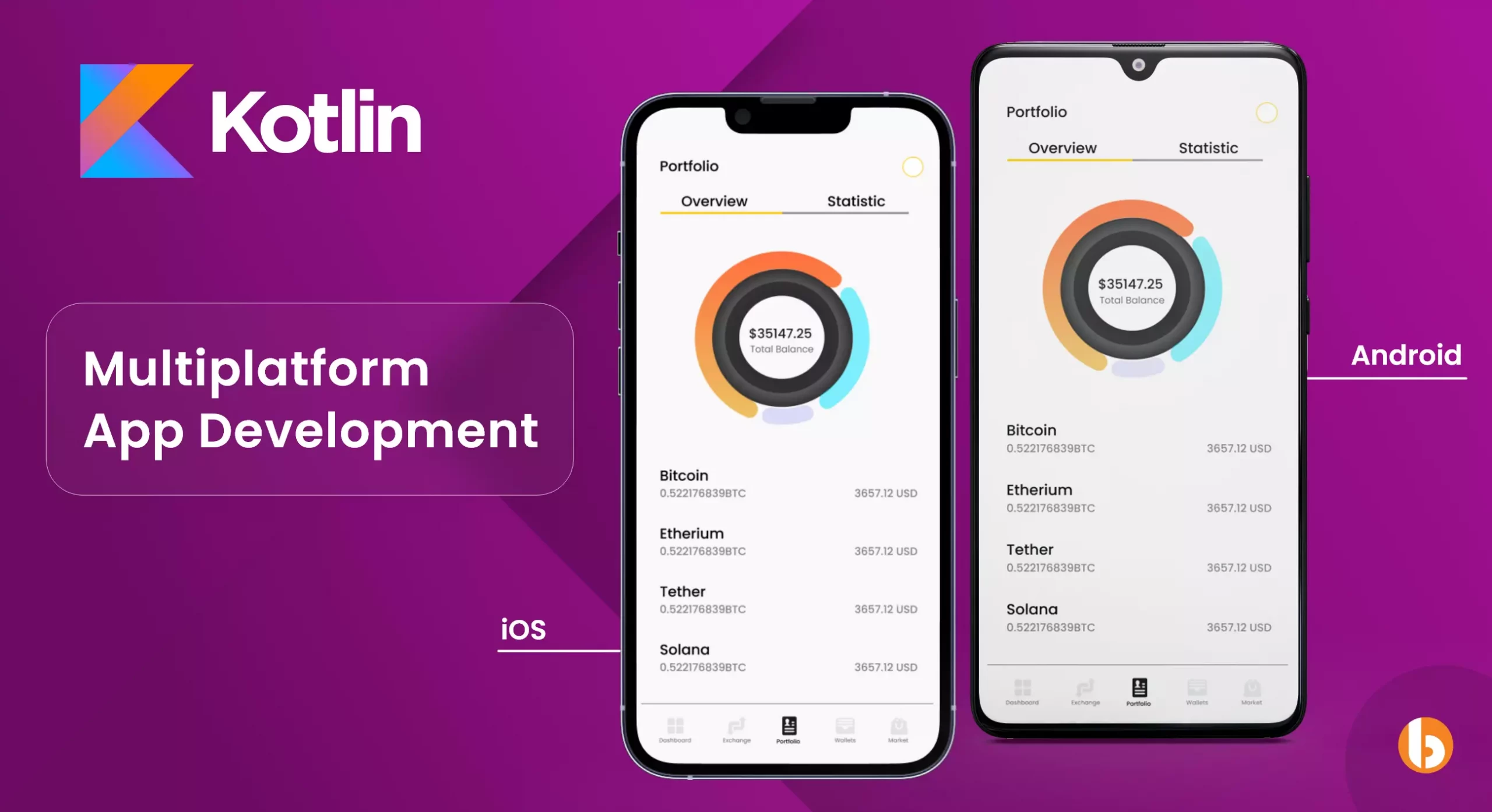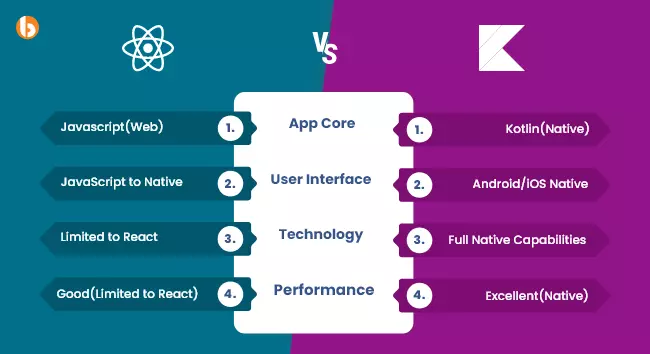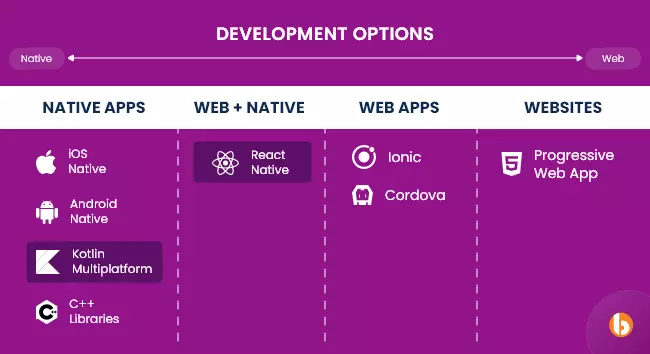| PROS | CONS |
|---|---|
| Using React and JavaScript | Performance problems |
| Excellent support and community | Issues with memory management |
| Hot reloading supported. | Holds restricted Android and iOS support |
| Perfect for MVPs and small teams | JS bridge for native platforms |
| Ready-to-use libraries and modules | Reusable code |
| Native-like user experience |
Highlights on React Native vs Kotlin:
🟠 Both React Native and Kotlin are open-source, but one is a framework and the other is a programming language.
🟠 In the React Native vs Kotlin battlefield, React has a mature ecosystem and strong community support. Whereas, Kotlin, being comparatively new in the market, has a growing ecosystem supported by Google.
🟠 However, Kotlin is an ideal match for native app development, but React Native serves best for both native and web applications.
🟠 When it comes to the cost of development with Kotlin vs React Native, CTOs prefer React Native as it costs less compared to Kotlin.
🟠 Consider Kotlin if you need interoperability with Java. Else, prefer React Native to leverage its ‘learning once, and writing everywhere’ advantage!
Read the following blog to better understand the differences between React Native and Kotlin, along with the similarities they share, their use cases, and more. This competitiveness will help you choose the right fit for your upcoming app development.
Table of Contents
React Native or Kotlin? Deciding Factors for your Cross-platform App Development
Business owners often get confused as to which mobile app development language or framework will be ideal for building their cross-platform application to peak their business goals. Before you jump to the React Native vs Kotlin tussle, figure out what is your exact requirement and purpose with your business application.
The following questions will help you classify your needs and hence make it easier for you to decide between Kotlin multiplatform or React Native.
Q. Is your app primarily targeting mobile devices or multiple platforms?
While Kotlin is specifically designed for desktop applications, React Native is best for mobile applications. Kotlin simplifies code sharing between various platforms because developers can compile it down to JavaScript. Consequently, you need to figure out if your application holds any specific need over any other platform. Based on that, you can select the best cross-platform development tool for your next mobile application.
Q. Is your application going to have a large user base?
In case your application holds a wide user community wherein you need to support various platforms at the same time, you need a faster and more scalable development tool. In such a case, React Native becomes a better choice. However, if you aim to build a single cross-platform application with endless limitations, you can ask your developers to go with Kotlin.
Q. Have you previously built cross-platform apps for your businesses?
React Native works exceptionally well when it comes to building cross-platform applications. Although React Native is scalable, Kotlin has an advantage over it. Kotlin is the best choice when your mobile app developers don’t have any experience in building cross-platform applications. This is because the latter is way easier and simpler to learn as compared to the former.
Once you answer these questions, you can easily find the winner of React Native vs Kotlin for your enterprise app development.
Introduction to React Native and Kotlin
React Native and Kotlin are two of the leading cross-platform development tools used by developers to build robust mobile applications. However, which of the two is superior? Let us begin with Kotlin vs React Native basics.
React Native
Initially released on 26th March 2015, React Native is a JavaScript framework. The developer’s community, i.e., Facebook created React Native to write real, native mobile apps for Android and iOS besides reusing codes across mobile and web apps. It builds user interfaces that are ideally designed for mobile platforms. React Native helps developers in building truly native mobile apps with the help of their classic favorite, JavaScript.
Additionally, React Native makes code sharing for both Android and iOS quite easy. Developers can share it between platforms without hassle. You can build a rich mobile UI from the declarative components of React Native, thus releasing a perfect RN app.

🟠 Supported Platforms: React Native supports iOS 8+ versions and Android 4.0.3+.
🟠 Special Advantage: React Native serves high code reusability between platforms. Moreover, the RN developer community has built a wide number of libraries that can be used by developers as building blocks, thereby boosting the development process.
🟠 When To Use: Go for React Native when you are willing to have a universal code for web, mobile, or desktop.
🟠 Pricing: Because React Native is open-source, developers can employ it free of cost.
Kotlin
Developed, designed, and sponsored by JetBrains, Kotlin is a programming language. It runs on JVM. It was when Google endorsed Kotlin as the official language of the android studio, that it started gaining popularity consistently. Kotlin is dedicated to building the best IDE tools.
In addition, this programming language offers excellent support in a separate development environment like an Android Studio. When you choose Kotlin for your business app development, you can help your developer gain support across multiple IDEs and tools required to build your Android project. Kotlin holds a highly clear codebase. It is concise and precise, thereby leaving very few chances of potential errors and facilitating stable code in production.

🟠 Supported Platforms: Being an android compatible language, Kotlin can run incredibly across all the iOS 8+ and Android versions.
🟠 Special Advantage: Because Kotlin is not a software development kit but a general-purpose programming language, developers don’t require to port the entire app to it.
🟠 When To Use: Ideal for android application development.
🟠 Pricing: Free of cost
| PROS | CONS |
|---|---|
| Simpler and concise syntax | Relatively new in the market |
| Safe, modern language | Restricted resources |
| Cross-platform support | Currently, in the evolving phase |
| Easy to debug | Comparatively, slower than Java |
| Interoperable with Java | Robust support and community |
| Is compatible with all Java libraries and frameworks |
React Native vs Kotlin: Table of Comparison
Listed below is a quick tabular representation of the major fields of difference between React Native vs Kotlin.
| Parameters | React Native | Kotlin |
|---|---|---|
| Created By | JetBrains | |
| First Released On | 26th March 2015 | February 2016 |
| Programming Language | JavaScript | Kotlin |
| Ecosystem | Mature | Newly Supported by Google |
| Description | Open-source, UI software framework used to build native apps with React | Statically typed, general purpose programming language | Components Library | Wide inclusive library | Limited library |
| Hot Reload | Supported | Not supported |
| License | MIT/td> | Apache 2.0 |
| Key Reason To Pick This | “Learn once, write everywhere” factor | “Interoperable with Java” factor |
| Learning Curve | Easy for individuals who have a basic knowledge/ have experience working with JavaScript or React earlier | Easy for everyone because Kotlin syntax is quite similar to that of Swift and Java |
| Cost of Development | Less | More |
| GitHub Stars | 79.7K GitHub stars, 17.8K GitHub forks | 28.6K GitHub stars, 3.33K GitHub forks |
| Approval Stacks as per Stackshare | 979 company stacks and, 4367 developers stacks | 388 company stacks and 932 developer stacks |
| Popular Applications Built With | Facebook, Skype, Instagram | Evernote, Slack, Netflix |
Comparison Parameters for React Native vs Kotlin
Looking at the statistics, React Native holds an excellent rank in the list of the best cross-platform development tools. Yet, the latest launch of the Kotlin multi-platform is giving tough competition to the former. Suited with an array of modern features, Kotlin supports cross-platform development for iOS and Android entirely. This brings us down to the React Native vs Kotlin feature comparison. Below are a few parameters that state the dissimilarities between the two development tools briefly in different aspects.

🟠 Performance
The very first Kotlin vs React Native parameter – performance. Speaking of it, React Native offers a native-like experience to developers. It enables developers to build applications with the help of native modules and JavaScript. It is fast, scalable, and delivers a native feel and looks on both platforms, i.e., Android and iOS.
On the contrary, Kotlin allows developers to write platform-specific codebases smoothly and share business logic that is written in the programming language. Although applications built with Kotlin are undoubtedly fast, it cannot beat the applications built with its adversary.
🟠 Difficulty Learning
Next – the learning curve. Although React Native uses powerful libraries and JavaScript, it has quite a steep learning curve. Developers who have prior experience or ideas with JavaScript will not face any major issues while using React Native for multi-platform app development. Moreover, because of the wide possibilities and adoption of the framework, seeking developers with expertise is quite easy.
Moving to Kotlin, it has a shallow learning curve. Due to the fact that Kotlin is fully interoperable with Java, there are a lot of developers who find it quite easy to use and learn.
🟠 Ease of Development
Developers who hold experience can easily leverage JavaScript along with native UI in order to build iOS and Android applications by employing the same codebase. This is because, development is a lot easier in React Native due to its hot reloading features, ready-to-use components, and native development capacities for developers.
On the contrary, Kotlin helps developers in reusing the multi-platform logic and writing platform-specific codebase whenever required. As a result, the entire development cycle becomes fast hassle-free, and easy.
🟠 Development Time & Cost
React Native is a perfect choice provided that you have a budget constraint. While building applications for multiple platforms, you would obviously not prefer overshooting the budget or timescales. Hence, React Native is ideal for developing MVPs and prototyping.
Similar to React Native, Kotlin helps developers to build faster and smoother applications with limited resources. Kotlin is a perfect choice if you have a time constraint. It takes fewer lines to write and deploy the working code in Kotlin, which leads to consuming a lesser app development time as compared to React Native.
🟠 Popularity
Tech giants and popular companies either use React Native or Kotlin to build their android apps. However, which of the two gains the most popularity? Well, Kotlin eliminates repetitive tasks from the development cycle and boosts the process, thereby enabling developers to work on a single codebase that runs on various platforms.
To name a few, Facebook, Bloomberg, Walmart, Instagram, Wix, Facebook Ads, Airbnb, Uber Eats, Discord, Discovery VR, and Townske use React Native. On the other hand, Netflix, Amazon, Twitter, and Pinterest use Kotlin for its android development among many other companies. Weighing the popularity and features of the apps, it seems like both React Native and Kotlin hold an excellent base.
🟠 Community Support
React Native has huge community support. Although the React Native documentation will be enough to get developers started with it, there are plenty of tutorials, online courses, and blog posts available for people who wish to gain a piece of comprehensive knowledge about the framework.
On the other hand, because Kotlin is a new alternative, it has limited community support and libraries. However, they are constantly evolving to improve and build strong community support.
🟠 Technology Stack
Because it is a JavaScript framework, React Native rests all of its development on JavaScript. Additionally, it renders its user interface using the JSX syntax, which is a JavaScript technology that offers all the benefits of the JavaScript language. This indicates that you require JavaScript knowledge in order to work with React Native.
On the contrary, Kotlin is a mobile application programming language that is native to the platform. This implies that you will be allowed to write native code for your Android application that interacts directly with native device hardware and has full access to it while developing it. However, from this vantage point, Kotlin and React Native both limit your ability to select the tools you want to use when developing.
🟠 Development Environment
Generally, a platform that holds lesser hoops and jumps will win. Developers can go ahead with React Native development with any text editor or IDE. This indicates that you can still ask your developer to use your preferred text editor. Moreover, installing React Native via the NPM package manager is a seamless and fast procedure that’ll hardly take 3 hours.
Want to build intuitive, visually appealing, and fully functional cross-platform app?
Hire React Native Developer to translate your innovative ideas to business value with a successful custom mobile app!
On the other hand, Kotlin offers the flexibility of building on multiple text editors and IDEs via IntelliJ IDEA. The installation and setup process for Kotlin does not take much time.
Popular Apps Built with React Native and Kotlin
Some of the popular applications built with React Native and Kotlin are listed below. Have a look.
Companies using React Native
There is a slew of companies that have built their applications using React Native. Some of them include
- Facebook Ads Manager – Category: Business
- SoundCloud – Category: Social
- Facebook Analytics – Category: Digital Marketing and Analysis
- Instagram – Category: Social
- Gyroscope – Category: Health and Wellness
- Bloomberg – Category: News and Magazine
- Myntra – Category: Shopping
- Skype – Category: Communication
- Discord – Category: Communication
- Discovery VR- Category: Knowledge and entertainment
- Tesla – Category: Shopping
- Wix – Category: Productivity
- Walmart – Category: Shopping
Companies using Kotlin
Similar to the React Native, Kotlin has also gained a popular base. Some of the famous companies that have used Kotlin to build their applications are,
- Pinterest – Category: Image sharing service
- Square – Category: Finance
- Trello – Category: Organizing and collaboration tool
- Evernote – Category: Task management and note-taking
- Slack – Category: Communication
- Corda- Category: Blockchain
- Tinder – Category: Dating, Communication
- N26 – Category: Neobank
- Netflix – Category: Entertainment
- Airbnb – Category: Tour and travel
- Basecamp – Category: Communication and project management
- Zomato – Category: Food delivery application

Conclusion
The answer to the heated debate React Native vs Kotlin can’t be easy for sure. But once your requirements are clear, you can find a straight answer to finalizing the tech-stack for your mobile app development. It might even turn up that you get to use React Native with Kotlin in your application. In that case, hire full stack developer from us as we can cater to your exact needs, and help you attain your business objectives flawlessly.
Frequently Asked Questions (FAQs)
Cost of development is less in React Native than Kotlin.
Developers find Kotlin easier to use and develop than React Native. However, apart from the learning curve, mobile app developers can create cross-platform apps using React Native and flawless native apps using Kotlin. Hence, it is a matter of preference and purpose.
Well yes, you can bridge Kotlin in React Native application.
Your Success Is Guaranteed !
We accelerate the release of digital product and guaranteed their success
We Use Slack, Jira & GitHub for Accurate Deployment and Effective Communication.





